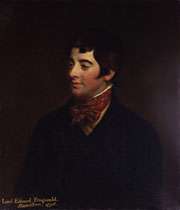Edward Fitzgerald
part 2

There was clearly a homoerotic element in some of FitzGerald’s friendships: this is the probable reason for the fiasco of his marriage; his wife later wrote of her husband’s propensity to become infatuated with “any embryo Apollo” (Martin, p. 44), a circumstance which came to be of fortuitous significance for his eventual interest in Persian poetry as it was an important factor in his involvement with Edward Byles Cowell (1826-1903), who taught him Persian. In general his male friends fell into two broad categories; they were either literary figures like Tennyson, Thackeray, and Barton, or handsome men who were considerably younger than FitzGerald—the “any embryo Apollo” of his wife’s phrase—and who tended to live a life of strenuous outdoor activity. Two such relationships were particularly important to him: The first was with William Kenworthy Browne, a country squire who spent much of his time hunting (he died as a result of a fall from a horse) and, after Browne’s death, with Joseph (Posh) Fletcher, a Lowestoft fisherman whose features, FitzGerald said, reminded him of Browne’s. It is unlikely that either of these men can have offered FitzGerald any kind of intellectual companionship, but in 1844 FitzGerald met Cowell, a young linguist. Cowell (who was then eighteen, FitzGerald was thirty five) combined the young, virile good looks FitzGerald felt so drawn to with a brilliant linguistic ability and a keen interest in literature; he had contrived to learn Persian as a schoolboy and had published his first translation, of a ?azal by ?afe?, at the age of sixteen (Martin, p. 138).
It was Cowell who taught FitzGerald Persian, and ?ayyam’s translator thus came to the language through friendship and shared literary interests, rather than by any of the more usual means for a person of his time and background (formal academic study, or membership of the Indian Army or Indian Civil Service).
FitzGerald never sat for a Persian exam in his life, nor did he ever go anywhere near the country; the furthest east he ever traveled was to Paris, and that only very briefly (Martin, pp. 64-65).
The literary/linguistic side of their relationship began with Cowell teaching FitzGerald Spanish and suggesting he read Calderon. With his young friend’s encouragement FitzGerald also began to write, and in 1851 he published a quasi-Platonic dialogue, Euphranor, in which he contrasted the two types of manhood he admired (the athlete and the intellectual) and concluded that the ideal, produced by an ideal education, would be an individual who combined the most attractive traits of both. In 1852 he published Polonius: A Collection of Wise Saws and Modern Instances, an anthology of aphorisms, some original but most culled from his very wide reading. This interest in aphorism, in concisely epigrammatic and memorable language that felicitously illustrates a general maxim, was one of the major reasons for FitzGerald’s later receptiveness to Khayyam’s poetry.
In 1853, FitzGerald’s Spanish lessons with Cowell bore fruit and Six Dramas of Calderon, Freely Translated by Edward FitzGerald appeared. These translations are significant in that they point the way to FitzGerald’s habits when he began translating from Persian. The word “freely” in the title indicates his readiness to recast the authors he translated in the interests of what he called a “readable” version (Terhune, II, p. 66). Significantly, the word “readable” recurs frequently in FitzGerald’s letters whenever he discusses his translations, whether from Spanish, as here, or from Persian, or later on from Greek. His concern was to make the authors he is interested in attractive to the Victorian reading public, and in order to do this he is quite ready to rearrange, recast and generally domesticate them to Victorian expectations. His instinct for the aphoristic is also present in his translations, and many of his revisions consist of drastic cuts in order to bring home what he takes to be the essence of the matter. It is apposite to remark here on FitzGerald’s habit of buying pictures and cutting them down and retouching them (Martin, p. 124), as also his editing of others’ poems, which generally consisted in his cutting away what he thought of as inessential in order to reveal more dramatically what he took to be the best moments. In all these activities—retouching others’ paintings, editing others’ poems, translating others’ literary works—we see how necessary the stimulus of another mind was for FitzGerald, and this is also true of course of the other literary activity in which he excelled, that of letter writing. The practice of literature for FitzGerald was an extension of his capacity for friendship, and it is no coincidence that virtually all his writings were the direct result of others’ (usually Cowell’s) encouragement, as well as being based on already extant works to which he could then respond.
To be continued ...
Source: iranica.com
Other Links:
I Came
Beheshti, Martyr of the True Path (Part 1)
Beheshti, Martyr of the True Path (Part 2)